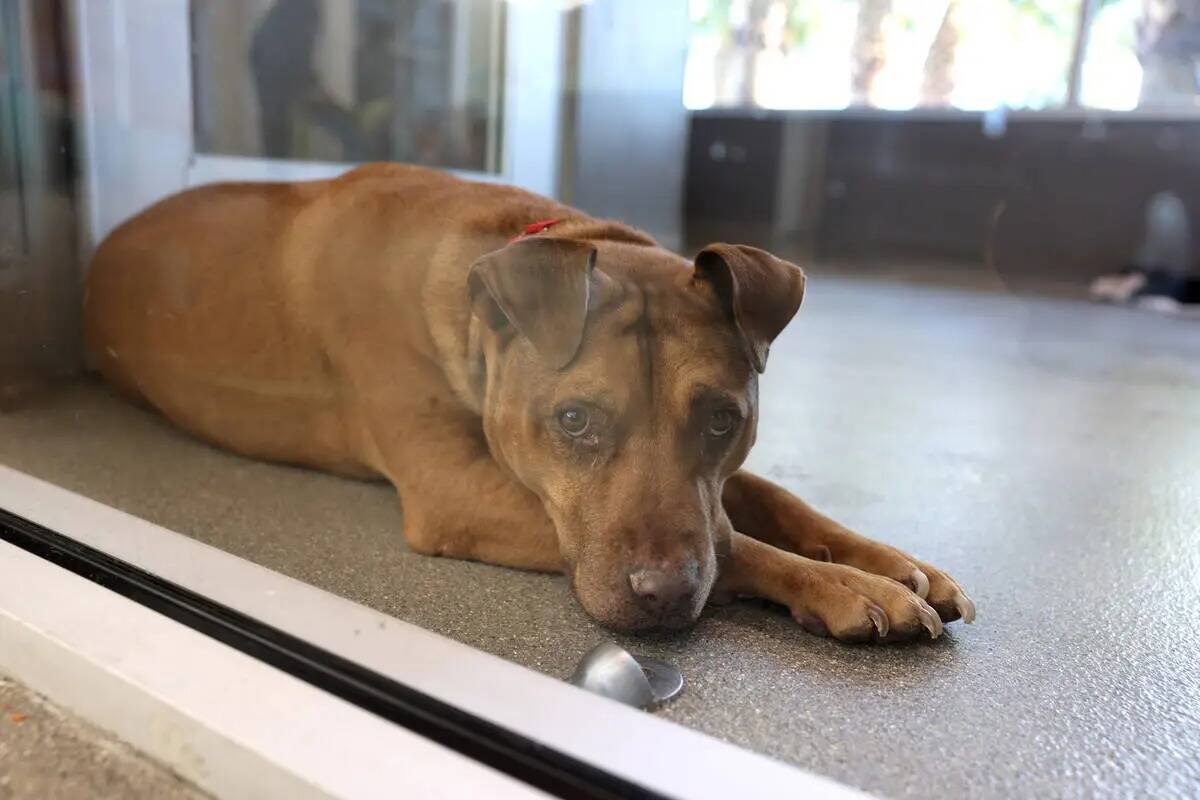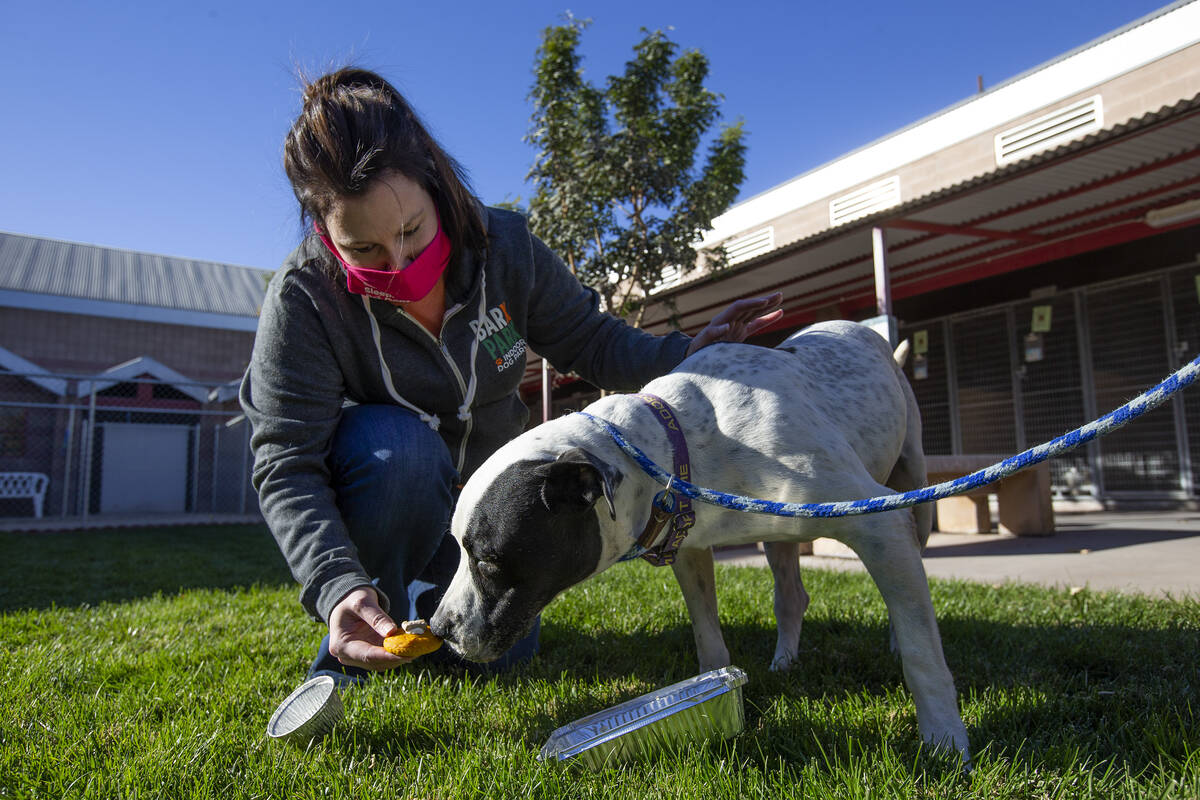3 shelters trying to save dogs as canine influenza spreads
Three valley animal shelters are taking measures to cope with a highly contagious disease that has been spreading in their buildings and likely among the valley’s dog population.
The Animal Foundation in Las Vegas said Friday that it has nearly 150 dogs symptomatic for infectious respiratory disease and seven confirmed cases of canine influenza virus.
The Henderson Animal Shelter reported Wednesday that it has one confirmed case of H3N2 canine influenza virus, five dogs pending test results and several symptomatic dogs under treatment. It is temporarily restricting the intake of dogs.
Nevada SPCA is reporting one dog with a confirmed case and four cases awaiting test results.
H3N2 presents symptoms akin to “kennel cough,” including sneezing, nasal discharge and persistent coughing, often accompanied by fever and lethargy.
Pet foster parents have responded to assist the Animal Foundation, whose dog population has been reduced this week with more than 160 dogs heading for foster homes. But 221 dogs remain available to be fostered, and foster parents for medium and large dogs are needed. TAF also has a wish list on its website for people to donate items the organization needs to deal with the influenza situation.
“We’ve done a sampling for testing so we have confirmation canine influenza is here,” Animal Foundation spokeswoman Kelsey Pizzi said. “And we’ve seen the number rising because it’s so contagious.”
The Animal Foundation is open Tuesday through Sunday from 11 a.m. to 7 p.m. for fosters. Prospective fosters can come directly to the shelter, 655 N. Mojave Road.
“Fostering is free and doesn’t have to be forever — even a couple of weeks is a huge deal,” the website posting stated. “If this is your first time fostering with us, please fill out a foster application before you arrive.”
Henderson has implemented restrictions on dog intakes, prioritizing those that are injured or ill or pose a public safety risk, according to a news release.
Danielle Harney, administrator of the Henderson Animal Shelter, said the flu virus did not originate within the shelter but is believed to have been brought in by at least one previously infected dog who was surrendered.
In response, the shelter has temporarily stopped accepting new animals to prevent further spread, and it is quarantining and treating affected animals. Adoptions have also been temporarily halted.
Harney emphasized the importance of timely and precautionary measures during the next four weeks, while staff focuses on separating, testing and caring for exposed and symptomatic animals.
“Asymptomatic animals can still transmit the virus, if infected, and we urge all pet owners to take precautions to protect their furry friends and minimize community spread,” Harney said.
Nevada SPCA has gone to an online adoption protocol where people can view a possible adoptee online and do all paperwork before setting an appointment time to pickup the animal.
Amy Lee, communications manager for Nevada SPCA, said adoptions of other animals are following normal procedures.
Tips for keeping pets safe and healthy
— Spread of this virus is mainly done through respiratory droplets (from coughing/sneezing) or through fomites (coming into contact with surfaces that haven been contaminated). Respiratory droplets can travel over 20 feet in the air which greatly facilitates spread of disease.
— Make sure pets are up to date on their vaccinations. Speak with your veterinarian if you are unsure what they need.
— Even if your dog shows no symptoms, please refrain from taking them to dog parks, doggy daycare or any public places where unknown dogs gather.
— If you must board your dog, ensure that the facility is taking all precautions to prevent disease spread, which includes requiring vaccinations to board at the facility.
Factors to remember
— Canine influenza is caused by two viruses in dogs, H3N2 and H3N8, and are not known to spread from dogs to people; however, H3N2 can infect cats and typically results in sneezing and nasal discharge.
— A dog can be sick without showing symptoms for up to seven days, so foster dogs should be isolated from other pets for at least seven days after leaving the shelter.
— If your foster dog is already showing symptoms of a virus, you should isolate them at your home for three weeks.
— If you find a healthy, friendly dog in your neighborhood, to find their owner before bringing them to a shelter.
— Missing a pet or know someone who is? Check the Animal Foundation website to see if the pet is there. You can see all found animals here. If your pet is at the shelter, the foundation says it is willing to work with owners on reclaim fees if they cannot afford them. “Our goal is to reunite pets with their families whenever possible,” the website stated.
Contact Marvin Clemons at mclemons@reviewjournal.com. Follow @VegasMarvRJ on X.



















